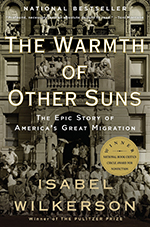Our website has, among our resources, links to a report that looks at the violent history of lynching in America. One of the results of this era of racial terrorism was the Great Migration. Between 1910 and 1970, six million black Americans fled the South to escape lynching, unfair labor practices, and harsh segregationist laws. This summer, we invite you to join us in learning about this era by reading Isabel Wilkerson's award-winning history, The Warmth of Other Suns. Mark your calendar for a book discussion on the evening of Sunday, September 20.
In this post, we have a guest blogger, McAlister Merchant. McAlister was the first African-American student to graduate from an all-white Catholic boys high school in Chicago. He started there in 1957 on a scholarship, well before Martin Luther King Jr's efforts came to prominence. McAlister was at the pushing, shoving, bleeding edge of integration, but overcame his situation peaceably, successfully, and with grace.
My Family Was Part of the Great Migration
by McAlister Merchant
I recently read the book "The Warmth of Other Suns," understanding for the first time that I was part of what has been called the Great Migration. I was, at first, surprised that I'd never heard about it before or, especially that I was part of it.
With the information from Isabel Wilkerson, I've begun to understand to some small degree, I think, why I know so little. My paternal grandfather, Jesse Merchant Sr., was at the edge of the first wave of the "Negroes" move from the "Slave South" to the "Free" North. He and my grandmother were born in 1893. Grandpa Merchant moved from Kentucky to Chicago between then and the census of 1920. When I was born in 1943, he was a chemist working for the federal government. My parents, my sister, and I lived in his house from the time I was about 4 years old until I was 9 or 10. "Grandpa", as far as I knew, owned that house, and it was the house in which my father, his brothers, and his sister grew up.
I know much less about my mother's family. When I was young, we moved about every two years. Grandma and Grandpa Miller moved with us so almost every time we moved, it was to a larger or nicer place. I understand, now, why. That generation of Negroes from the nearby slave South moved to this racially divided heart of the Midwest. My parents were doing for us the same things that their parents had done for them. They were dragging children (and as many relatives as they could afford to) from where they were, through the hard edge of a dream, into a place others didn't want them to share.
In those years, adults never talked about interracial matters, except as a nuisance. I didn't understand why my white friend Jerry moved just a couple months after we moved in. I never knew why there were fewer and fewer white children in my grades each year. I didn't understand what interracial "problems" meant, until the Principal of the high school I was about to enter very carefully mentioned that threats had been made about my attendance at this Catholic school, in a neighborhood the Archdiocese was trying to integrate. Standing to leave the interview my father said, "Well that's what you're here to prevent. He's coming to this school."
In 1957, I didn't understand what was going on. Till then, I had been proud to get the scholarship. I didn't understand that there was a price on my head and a hand at my back. It took two busses to get there; through three neighborhoods in which the ridership was less and less racially 'mixed'. In a school of 2300 boys with three buildings and two locker rooms, there are many places that teachers couldn't cover. In a school of that size, the hallways are "trails of tears".
One day, as I left school early in order to avoid the stares, the pushing, and the tripping, it came to me. If I continued this way, I'd get my education; I'd make it through four years of books, lectures, and homework. However, if I continued to be afraid, I'd be robbed of the "high school experience." I understood then that I HAD to fight for myself. So I joined everything I could find time for: the City high school newspaper, the debate club, even the bowling team, for which I earned a letter.
It's not the fear alone that wears you down, it's the theft of your spirit, it's the denial of place, of right, of regard. It's the constant wariness in order to just get a seat on the bus, or the train; to go to the store, or to the library, or to the party, and get home safe and sound, and still joyful. It's working so hard and making so much less than everyone else, that you arrive home with nothing to share but your pain, your despair, your anger.
Editor's note: In 2005, McAlister was honored as that first Black graduate and is listed among the 100 Distinguished Alumni at St. Rita of Cascia High School in Chicago.

